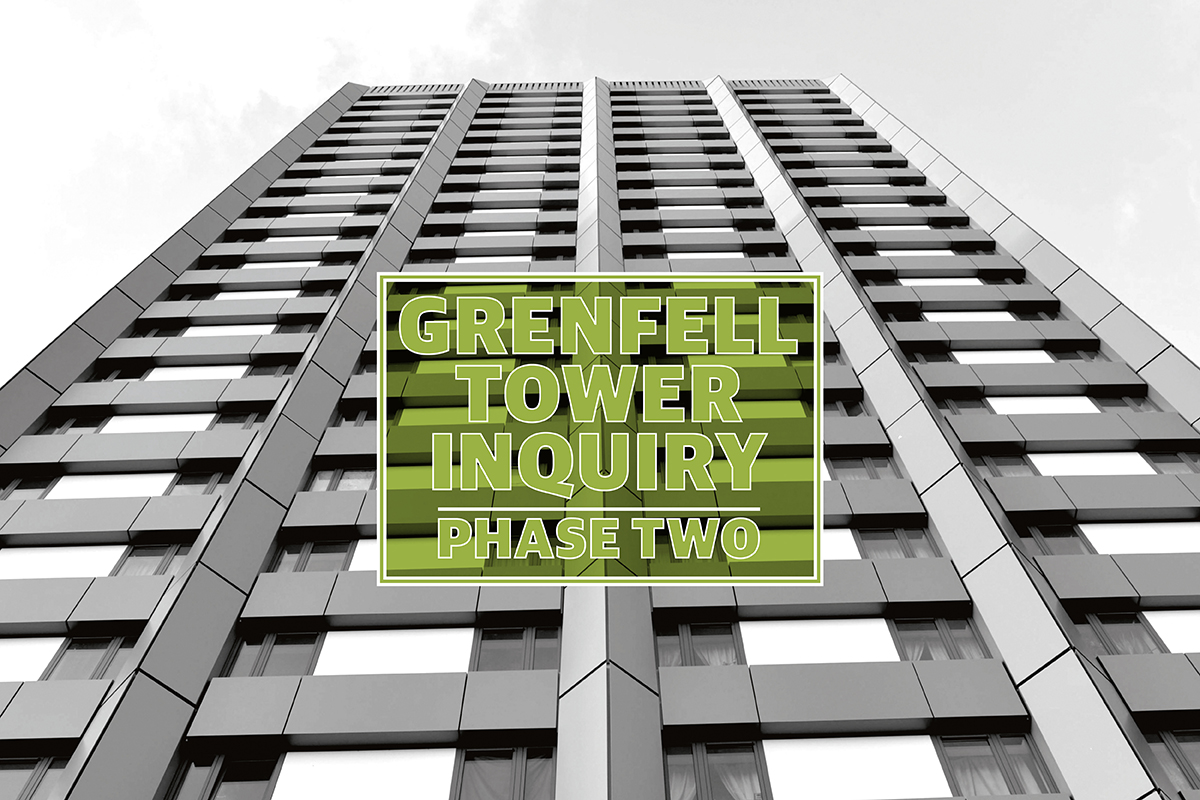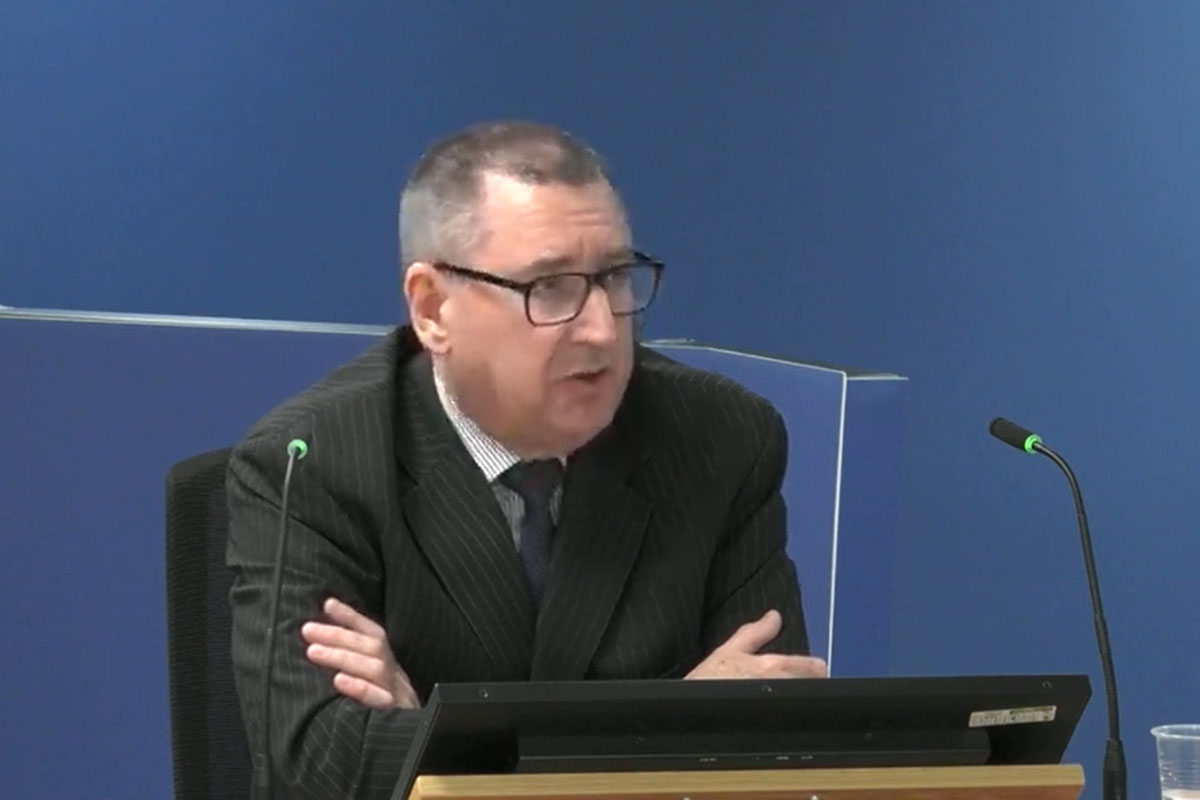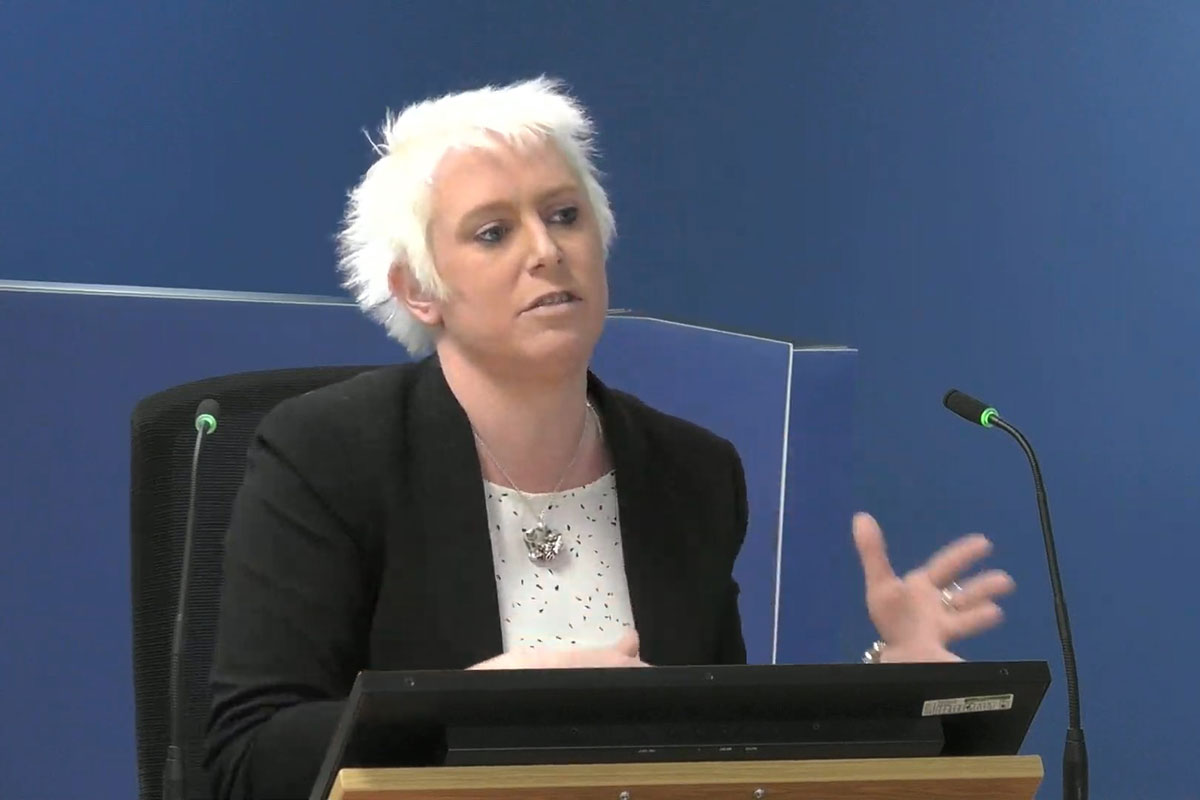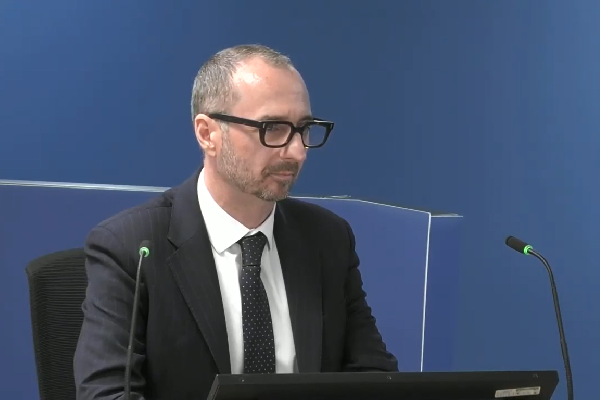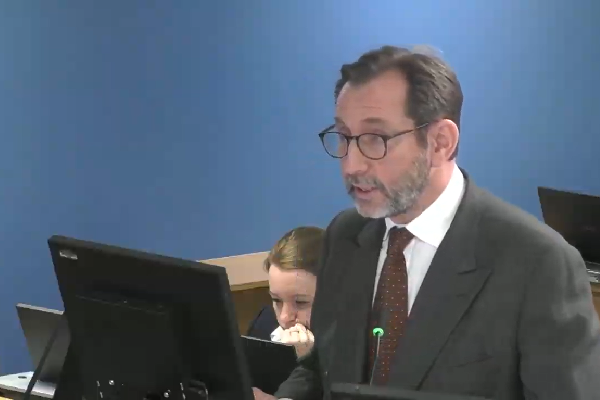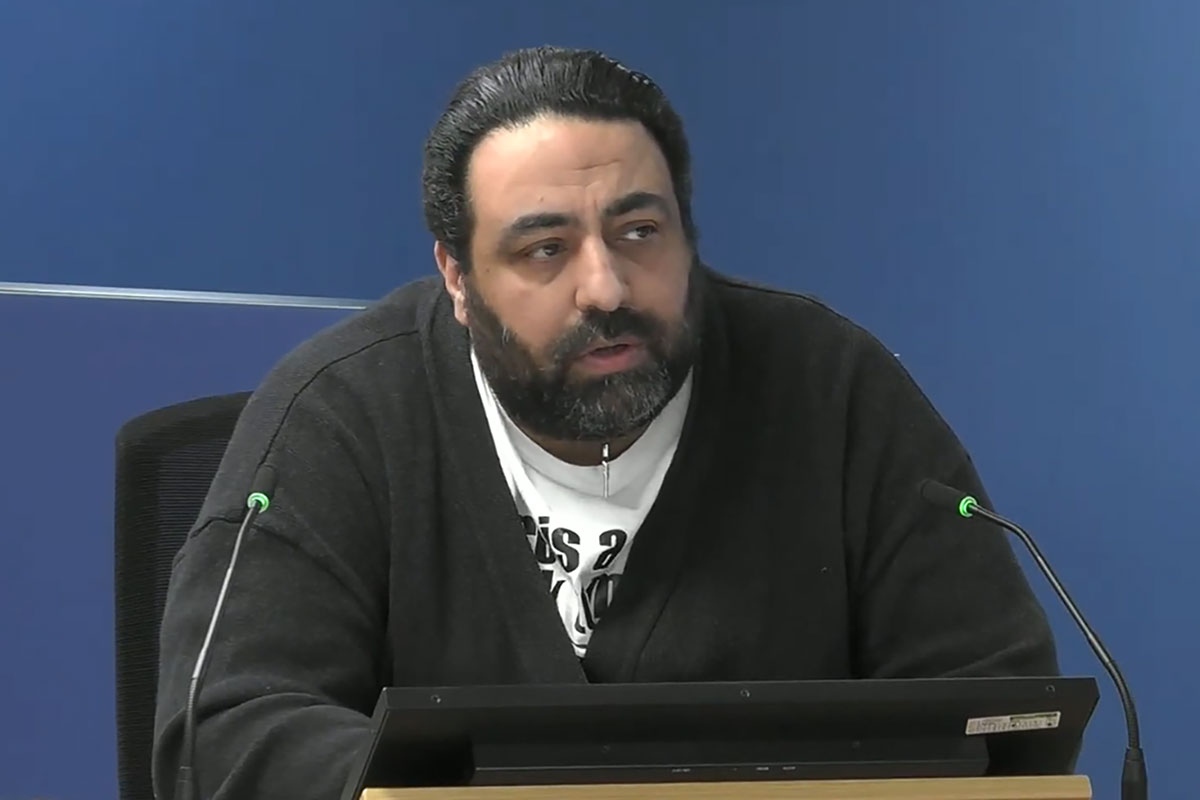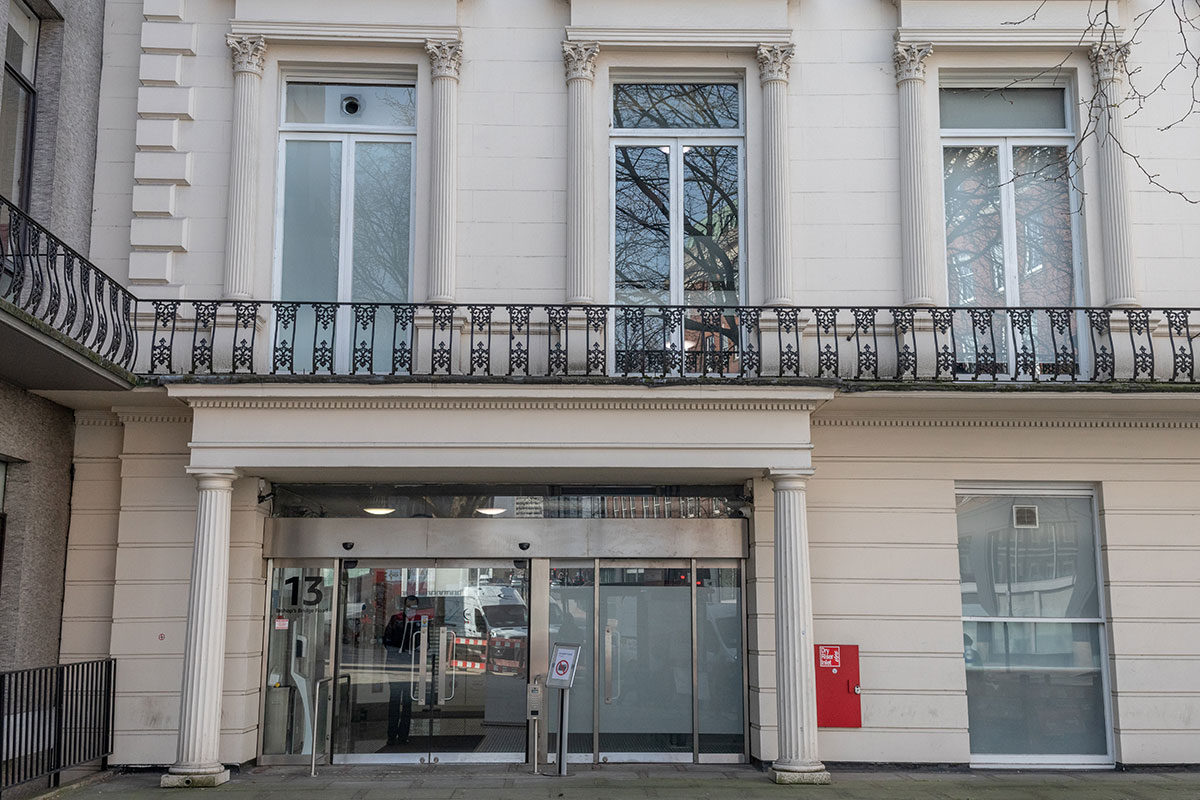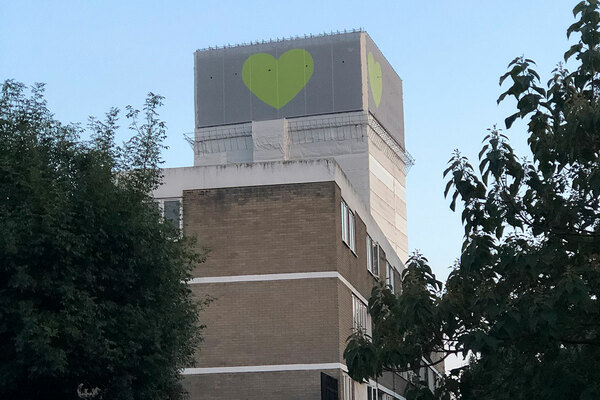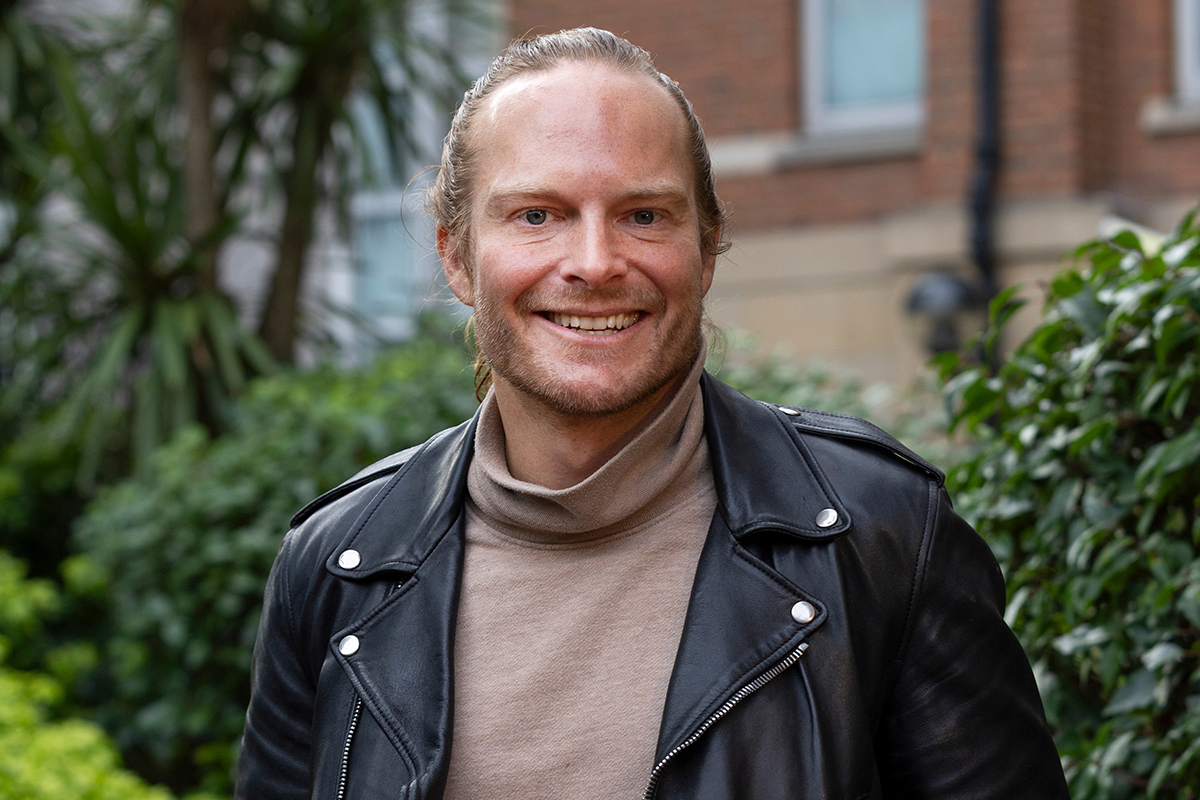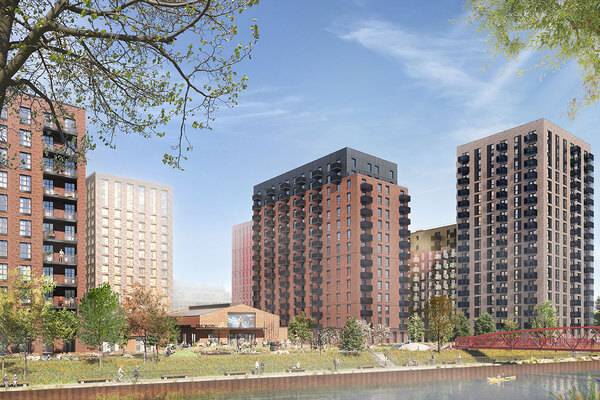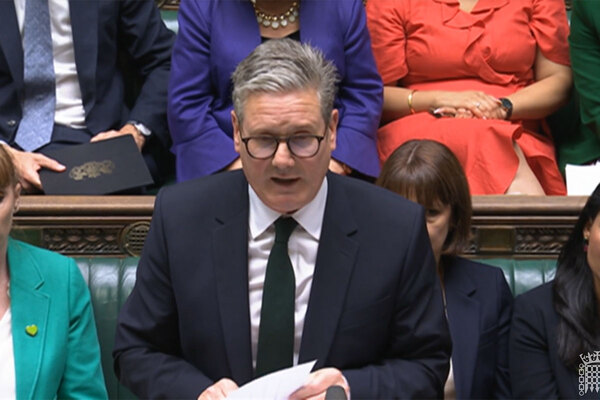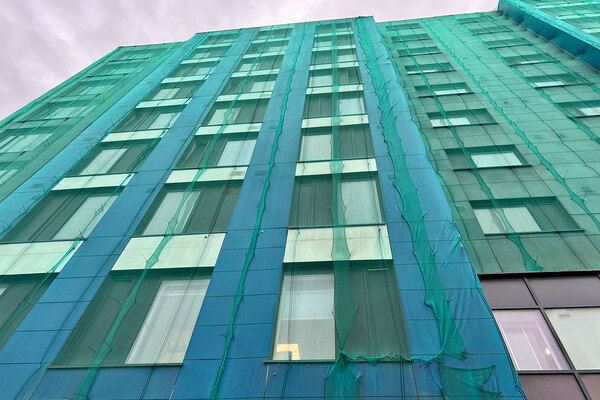Grenfell Tower Inquiry diary week 73: ‘Most people would regard that as hopeless’
This week, the Grenfell Tower Inquiry heard about the Royal Borough of Kensington and Chelsea’s chaotic response in the immediate aftermath of the blaze, from the staff responsible for it. Pete Apps, Stephen Delahunty and Grainne Cuffe report.
‘You have a massive fire, Grenfell Tower’
At 2.21am on 14 June 2017, David Kerry (pictured) was woken by a phone call. As contingency planning manager at the Royal Borough of Kensington and Chelsea (RBKC), he was responsible for setting out how the council should react to a major disaster. And a disaster was unfolding.
The duty officer told him there was a fire at Grenfell Tower, people were trapped and casualties were expected. Mr Kerry phoned his line manager, Stuart Priestley, at 2.50am and told him what was happening. Local authority liaison officers were dispatched to the scene, as well as the British Red Cross.
But Mr Kerry did not immediately head to the town hall and set up an emergency command centre, as documents suggested he should for a major incident. “I was conscious that… people were going to be needing to put in a long day, and there’s that balance: do you call out the resource you’ve got now and exhaust them early, or do you wait a little bit longer and enable them to go through a full day?” he said.
He had not, at this stage, appreciated the scale of the incident that was unfolding in north Kensington. “It didn’t occur to me to turn the TV on at home, so I wasn’t seeing what was going on in that respect. So I think, had I seen the image, I would have taken more action earlier,” he said.
Meanwhile, Mr Priestley, who had been woken up by Mr Kerry’s call, checked his emails. “You have a massive fire, Grenfell Tower,” the borough commander had told him at 2.20am, attaching photographs of the fire ripping through the building.
He elected to head to the town hall and open the emergency command centre. He took an Uber to the town hall, arriving at 4.38am.
He went to the room in the basement of the town hall which was supposed to act as the nerve centre of the council’s response to the incident. But he could not access a cupboard where the critical equipment was stored. He needed to get into this cupboard to “allow the desk to rise, which gives you access to the telephones and the IT and the suite of paper documents that one might need”. But the key to the cupboard was nowhere to be found.
“So I sort of got that far and was unable to go any further,” he said. In the event, the key could not be found.
“Can you come PDQ [pretty damn quick]. We cannot get into the cupboards,” he wrote in an email to Mr Kerry.
Mr Kerry arrived at 6am with a spare key. The nerve centre was finally up and running nearly four hours after the crisis team had first been notified of the fire.
Asked to describe the system for access to the cupboard, Richard Millett QC, lead counsel to the inquiry, asked: “Did you ever get to the bottom of why this supposedly robust system for making sure that the key was there when needed, failed on the night?”
“No, the answer was just simply nobody could find it, nobody knew why it wasn’t there,” said Mr Kerry.
“Most people would regard that as hopeless,” said Mr Millett.
“I can only tell you we put in what we thought was the appropriate security system with the security staff, and I can only tell you that, very unfortunately, that key was not there at the time it was needed,” replied Mr Kerry.
Even once the computers were accessed, there were IT problems which had to be resolved by IT support staff. The inquiry saw emails revealing this had actually been raised a month before in a report by Mr Kerry as a “corporate risk”. He had said new operating systems “run very slowly on these machines”.
New computers were on the way, but had not been delivered at the time of the fire. “Why had the IT system in the [command centre] been allowed to become so old and slow and outdated?” asked Mr Millett. Mr Kerry said the team had “identified the issue and acted upon it”.
It was a chaotic start. Things would get worse.
‘The incident was lost in the first three hours’
One of the key jobs was setting up rest centres, where those fleeing the tower and surrounding buildings could go for food, shelter, relief and to receive additional support and information.
But this was already chaotic. The first site identified by the council at 3am was Belushi’s, a bar in Shepherd’s Bush, but this eventually had to be closed at 5.30am because it was more than a mile from the tower.
By 7am, there were rest centres open at the “Rugby Portobello Trust, Harrow Club, Clement James Centre, Westway Sports Centre and other locations in the area such as small churches”.
The British Red Cross, who was on the ground at the scene, was asking where the council’s managers for these centres were, but was not getting answers.
The council then appears to have attempted to consolidate the rest centres, leaving the Rugby Portobello Trust, a local charity, as the main venue.
But there was substantial confusion in the logs about exactly what was happening and still the council did not have a large presence of staff on the scene. It was not recording rest centres being opened spontaneously by the local community.
“By that time I was both physically exhausted − I’d only had two hours’ sleep that night – and… I was also getting quite emotionally affected as well,” said Mr Kerry.
Rebecca Blackburn (pictured above), Mr Kerry’s colleague, arrived at the town hall at 7.20am. She called the command centre at the town hall “complete pandemonium”.
She was told to take command of the nerve centre at the town hall, despite not being senior enough to do so or having decision-making powers. When she raised concerns about this, she was simply told to do it.
“David [Kerry] did not know how many rest centres were open and how many people were at each,” she said in her evidence. “He said that the Red Cross were at one, but confirmed that no borough staff had been deployed. Therefore, the first people that the survivors met were Red Cross staff and local councillors.”
A log of the incident shows that, from 5.30am for five hours, the British Red Cross made repeated requests to the council for updates about when RBKC staff would attend the rest centres to provide support.
But they were not deployed until around 10am, when staff from the housing department, adult social care and children’s services were deployed by Ms Blackburn.
“Are you able to explain why RBKC staff were not deployed to rest centres earlier?” Mr Millett asked Mr Kerry.
“No,” he replied.
“As a category-one responder and a local authority responsible for opening and operating rest centres, are you able to account for the delay in sending RBKC personnel to rest centres?” asked Mr Millett.
“I think a combination of the lack of trained staff in that role ourselves, the lack of getting in the mutual aid [from other boroughs] at that point, which we had already recognised that we could have done, and I think probably a little bit overwhelmed by the overall speed and the circumstances. It’s not satisfactory,” he said.
Ms Blackburn’s damning assessment of the initial response was that because her superiors did not realise the scale of the fire, “they didn’t deal with it early enough” and as a result “the incident was lost in the first three hours”.
Asked if a lack of training and testing affected the council’s response to the fire, Ms Blackburn said: “Absolutely. People were not 100% aware of what they were doing.”
‘That looks like we can’t cope’
At 10am, the emergency response staff held a meeting with Nicholas Holgate, the borough’s chief executive and the ‘gold commander’ of the incident.
A log of the meeting records Mr Kerry saying: “This incident is bigger than any one local authority in London can manage [and] consideration should be given to asking for mutual aid.”
This would mean activating a formal process that would trigger help from other boroughs.
Asked what led him to form this opinion, Mr Kerry said “the clear understanding that we didn’t have sufficient staff” to maintain the command centre “for what was going to be an extended period”.
He said in his statement: “I believe that none of the 33 LAs [local authorities] could have coped with the scale of the Grenfell Tower and response on their own.”
“I believed that then, I still believe that today,” he said when asked.
But Mr Holgate does not appear to have agreed. “David [Kerry] advised Nicholas [Holgate] of the mutual aid arrangements available… Nicholas stated, ‘That looks like we can’t cope’. The conversation on mutual aid at that point ceased,” a log prepared by Mr Priestley (pictured above) says.
“Can you think of any justifiable reason at the time or any advantage for RBKC in not seeking mutual aid?” Mr Millett asked Mr Kerry.
“No, it was an absolute given in my mind that we were at the point where this is a massive disaster and we need mutual aid, and that’s what the mutual aid arrangements are for. That’s why I would have been giving that advice from the word go,” said Mr Kerry.
When he gave evidence, Mr Priestley was asked by Dermot Keating, counsel to the inquiry: “Was it the position, actually, that there was a concern at the most senior level of RBKC that to seek outside help at that stage would look like a sign of weakness or an inability to cope?”
“I don’t know the answer to that question, because all that was said was that one sentence. That struck me, that’s why I recorded it,” he said.
Mr Priestley said he initially did not appreciate the scale of the incident, but formed the view by the next day that mutual aid should have been invoked. However, it was not for another 36 hours.
Asked why he – as the silver command and effective number two – did not challenge Mr Holgate over this, he said: “I didn’t feel I had the experience to raise that to, and it would need to be to, Nicholas… This was my first incident. I’m inexperienced within this role. I didn’t feel that I had the mandate or the place to say to the chief executive that he should change his tactics.”
For Mr Kerry’s part, despite believing the council needed additional support, emails show that he told an officer at the City of London authority “[we] have a handle on it” when offered support at 10.35am.
“I can only assume that I was reflecting the decision of the chief executive at that particular point that we were, as an authority, dealing with it,” he said when asked to account for this.
Trouble continued at the rest centres. A key task was to register who was arriving, so the council had a record of who needed support. Colin Brown, a British Red Cross volunteer, said the Red Cross was asked to write down details on triple carbon paper, with the lower two sheets to be provided to the council for record-keeping.
“A volunteer found a box containing a number of the second and third copies of the registration forms that had been filled in by the [Red Cross] and provided to the RBKC left lying around the Westway [rest centre],” he said in a witness statement.
“It appeared that no efforts had been made by the RBKC to collate the data in any sensible manner.”
Mr Kerry said he was “horrified” to hear this.
“Do you accept that this is an unacceptable state of affairs in relation to registering those who are affected by the fire?” Mr Keating asked Mr Priestley.
“Yes, I do,” he replied.
There were many other problems at rest centres: a lack of information for residents, difficulties accessing the centres, and a lack of support for the bereaved. The inquiry also learned this week that some of this appears to have resulted from a failure to prepare by RBKC.
‘Do you accept that, at the time of the Grenfell Tower fire, RBKC was ill-prepared to meet its duty?’
Councils are supposed to have a humanitarian assistance lead officer (HALO), charged with bringing together organisations such as health, police and the voluntary sector to oversee the humanitarian response to a disaster.
This role is normally filled by an executive officer, but RBKC had no one in this role.
Mr Kerry had identified this gap in a report in 2016, and “met with... the then executive directors of the departments that dealt with adult social care or with children’s services, and talked to them about this”.
His expectation was that one of them would fill the role. They did not.
“I’m afraid the response from them was less than satisfactory,” he said. “The response from one was, after we finished speaking, ‘But isn’t there somebody else who can do this, such as the British Red Cross’, and the response from the other was, ‘The chief executive needs to understand we are very, very busy as executive directors and it really is too much to ask us to take on these extra roles’.”
Mr Kerry identified the two directors as Jean Daintith and Anne Marie Carrie.
Mr Millett (pictured above) asked: “Is it fair to say that, leading up to June 2017, the absence of an operational HALO appointment was a significant deficiency in RBKC’s ability to deal with not just the aftermath of the Grenfell Tower fire, but any serious emergency?”
“I think I would agree with that statement, yes,” Mr Kerry said.
There was also a shortage of staff to get involved with the response. The council relied on ordinary staff members volunteering to be part of the “silver” team, who would ensure the council’s strategy was put into place during a disaster.
Mr Kerry said in the report that a minimum of 10 members are required for the silver team, while there must be a minimum of 20 incident response officers.
The report went on to state the number of borough silver staff was three, and would soon reduce to two. The number of incident response officers was 10.
In comparison, neighbouring Hammersmith and Fulham Council had eight borough silver and 20 incident response officers.
The inquiry heard that, in response, Mr Holgate suggested that trained staff from Hammersmith and Fulham could be approached to cover RBKC, but still suggested recruiting fewer staff than Mr Kerry had said was required.
Asked about this, Mr Kerry said he could not remember being in the meeting.
“It had been the philosophy at RBKC for as long as I was there... to seek volunteers for these roles,” he said.
He said he had produced other reports expressing the “same concerns and considerations”.
There were also problems with the experience of senior staff members. Mr Priestley, who would take over silver command on the day of the fire, had only had two training sessions in 2015 for doing so and no experience.
Ms Blackburn also explained that she did not think the borough’s emergency plans and drills were sufficient. “In my view, the borough’s plans had not been properly tested. We did not undertake sufficient large-scale emergency simulations.”
She explained how there was some pushback from colleagues who did not want to take part in an emergency exercise because they hadn’t been fully trained.
“I think, from their point of view, even though we’re not testing them [but] testing our procedures, it could be that we’re setting them up for a fall. Which obviously was never the point, because it’s our procedures that we need to test.”
“Looking at all of those things in the round, do you accept that, at the time of the Grenfell Tower fire, RBKC was ill-prepared to meet its duty as a category-one responder in a major emergency?” asked Mr Millett.
“Having heard all of this, I’m not in a position to say anything other than yes,” Mr Kerry said.
‘We are trying to get to our family and rescue them and we’ve been threatened with arrest’
On Monday, the inquiry heard from Nabil Choucair (pictured above), who lost six members of his family in the Grenfell Tower fire.
He described how he was threatened with arrest as he frantically searched for his loved ones, with the emergency response “falling apart” around him.
Mr Choucair said he found the threat of arrest “hurtful” after he had rushed to the tower with his brother to find out if his family members were safe.
But he described the chaotic scene as “the worst nightmare you could ever imagine and see”.
His frustration was evident as he recalled his struggle to get any information from the emergency services near the tower, or the designated emergency centres.
He was unable to find representatives from the government, council or the Kensington and Chelsea Tenant Management Organisation (KCTMO), the building manager.
One of the key problems for Mr Choucair was not just an absence of information, but an absence of how to get information about his loved ones.
“It was very unclear; it was so unorganised. You would think in a situation, in an emergency catastrophe, there is some form of plans, some sort of organisation but… everything was falling apart, and it was just so unorganised. It was so unhelpful. It was like we were trying forever, but with no help, or no sense of help or exactly what to do,” he said.
It would be weeks before Mr Choucair was formally told that his family members had perished in the fire.
Hanan Wahabi, who also gave evidence on Monday, was initially told that her brother and his family had been placed on a safe list, indicating they had survived, only to find out later that this was a mistake.
She recounted escaping the building and being left at the scene “until it got light outside”, with very little help or information from authorities, whose absence led to the inaccurate information about her family being shared.
She described the authorities’ response as her “worst experience ever”.
Later she recalled how the council did not appear to have a system in place for the allocation of emergency accommodation.
Ms Wahabi and her family were eventually housed in a single hotel room for the next 18 months, a period she described as “torture” as she recounted the physical and mental impact of the fire on her and her loved ones.
“You cannot imagine what it is like having no one there to help you. To give you any glimpse or bit of information, anything, any strings to hold on to when you don’t know what’s happened to your loved ones. It’s torture. We experienced torture. The aftermath was torture. It was physically and mentally torturing,” she said.
In a closing statement, she added: “In my experience, in the eyes of local and central government, our Grenfell and north Kensington community are second class, the people with needs and problems. I cannot help but feel that had our community lived in a different part of the borough, on the more affluent side, had we been from a different class, had we been less ethnic, the response in the aftermath would have been immediate.
“It would have been present. It would have been felt. We may be different, we may be diverse, but we are people… We are human beings. We contribute. We pay tax. We provide leadership in our communities. In truth, our differences and diversity are a contribution to the borough and the country.”
The inquiry continues.
Grenfell Tower Inquiry week 73: headlines
I was threatened with arrest while searching for family members, says Grenfell Tower bereaved
A man who lost six members of his family in the Grenfell Tower fire described how he was threatened with arrest as he frantically searched for his loved ones, with the emergency response “falling apart” around him.
RBKC had no humanitarian lead after senior executives branded themselves too busy
The Royal Borough of Kensington and Chelsea had no one in a “pivotal” leadership role for its humanitarian response at the time of the Grenfell Tower fire, after senior directors branded themselves “too busy” to take on the responsibility, the inquiry heard today.
RBKC manager refused help despite believing council could not cope alone
The head of emergency planning at the Royal Borough of Kensington and Chelsea told another borough the council “had a handle” on the Grenfell Tower fire despite previously telling his boss it was “bigger than any local authority in London can manage”, the inquiry heard today.
Boxes of documents containing details of those who had fled Grenfell Tower were left “lying around” emergency relief centres, amid the council’s “unacceptable” failure to record who had been affected by the fire, the inquiry heard today.
Sign up for our weekly Grenfell Inquiry newsletter
Each week we send out a newsletter rounding up the key news from the Grenfell Inquiry, along with the headlines from the week
Already have an account? Click here to manage your newsletters
Grenfell Tower Inquiry phase two: weekly diaries
Module one: the refurbishment
Week one: A vivid picture of a broken industry
After a week of damning revelations at the opening of phase two of the Grenfell Tower Inquiry, Peter Apps recaps the key points
Click here to read the full story
Week two: What is the significance of the immunity application?
Sir Martin Moore-Bick has written to the attorney general requesting protection for those set to give evidence at the Grenfell Tower Inquiry. Peter Apps explains what the move means
Click here to read the full story
Week three: Architects of misfortune
This week saw the lead architects for the Grenfell Tower refurbishment give evidence to the inquiry. Peter Apps runs through the key points
Click here to read the full story
Week four: ‘I didn’t have any perception that it was the monster it’s become’
The architects continued to give evidence this week, outlining a lack of understanding of the fire risk posed by the cladding materials and its design. Nathaniel Barker reports
Click here to read the full story
Week five: ‘No adverse effect in relation to external fire spread’
As the Grenfell Tower Inquiry returns from its long absence, Peter Apps recaps the key points from a week of important evidence from the fire consultants to the refurbishment
Click here to read the full story
Week six: ‘I can’t recall any instance where I discussed the materials with building control’
Nathaniel Barker summarises what we learned from fire engineers Exova, architects Studio E and the early evidence from contractor Rydon
Click here to read the full story
Week seven: ‘I do not think I have ever worked with a contractor operating with this level of nonchalance’
Two key witnesses from contractor Rydon gave evidence this week. Peter Apps recaps some of the key points from a revealing week of evidence
Click here to read the full story
Week eight: ‘It haunts me that it wasn't challenged’
Four witnesses from contractor Rydon gave evidence this week. Lucie Heath recaps what we learned on the last week of evidence before the inquiry breaks for five weeks
Click here to read the full story
Week nine: ‘All I can say is you will be taken out for a very nice meal very soon’
This week the inquiry heard evidence from witnesses at Harley Facades, the sub-contractor responsible for Grenfell Tower’s cladding. Peter Apps recaps the key points
Click here to read the full story
Week 10: ‘As we all know, ACM will be gone rather quickly in a fire!’
As the Grenfell Tower Inquiry entered its 10th week, Jack Simpson recaps the key points from a week of important evidence from the refurbishment’s cladding contractor
Click here to read the full story
Week 11: ‘Did you get the impression Grenfell Tower was a guinea pig for this insulation?’
With witnesses from the cladding subcontractor, the firm which cut the deadly panels to shape and the clerk of works which inspected the job giving evidence this was week full of revelations. Peter Apps recaps the key points
Click here to read the full story
Week 12: ‘Would you accept that was a serious failing on your part?’
With the surveyor who inspected Grenfell Tower for compliance giving evidence, this was a crucial week from the inquiry. Dominic Brady and Peter Apps report
Click here to read the full story
Week 13: ‘Value for money is to be regarded as the key driver for this project’
With consultants to Kensington & Chelsea Tenant Management Organisation (KCTMO) giving evidence, attention at the Grenfell Tower Inquiry turned for this first time to the actions of the TMO and the council. Peter Apps reports
Click here to read the full story
Week 14: ‘Did it not occur to you at this point that your budget was simply too low?’
This week, for the first time in phase two, the inquiry heard from Kensington & Chelsea Tenant Management Organisation, the landlord that oversaw the fatal refurbishment of Grenfell Tower. Lucie Heath reports
Click here to read the full story
Week 15: ‘Have you ever informed the police that you destroyed documents relevant to their investigation?’
Witnesses from the Kensington and Chelsea Tenant Management Organisation (KCTMO) gave evidence for a second week, which began with a shocking revelation about withheld and destroyed evidence. Peter Apps recaps
Click here to read the full story
Week 16: ‘I conclude this was very serious evidence of professional negligence’
This week saw members of Kensington & Chelsea Tenant Management Organisation finish giving evidence, before the inquiry’s expert witnesses took the stand to make some highly critical assessments of the work they had seen before and during the refurbishment of Grenfell Tower. Jack Simpson recaps
Click here to read the full story
Grenfell Tower: a timeline of the refurbishment
Following the conclusion of module one of the Grenfell Inquiry’s second phase, Peter Apps presents a timeline of the key moments during the fatal refurbishment of the west London tower block
Click here to read the full story
Module two: the cladding products
Week 17: ‘It’s hard to make a note about this because we are not clean’
The start of the second module of the Grenfell Tower Inquiry phase two came with some huge revelations about the companies that sold the products used in the cladding system. Peter Apps reports
Click here to read the full story
Week 18: ‘It was just reckless optimism wasn't it?’
As the inquiry began cross-examining witnesses for the second module of its phase two work, the picture surrounding just how Grenfell Tower ended up wrapped in such dangerous materials became a little clearer. Nathaniel Barker was keeping an eye on proceedings
Click here to read the full story
Week 19: ‘And that was intentional, deliberate, dishonest?’
The Grenfell Tower Inquiry this week heard the shocking story of how the insulation manufacturer “manipulated” official testing and marketed its product “dishonestly”. Peter Apps tells the story
Click here to read the full story
Week 20: ‘We were outed by a consultant who we then had to fabricate a story to’
This week the inquiry investigated the actions of Kingspan – the manufacturer of one of the insulation products used in the tower’s cladding system. Dominic Brady reports
Click here to read the full story
Week 21: ‘It’s there in black and white isn't it? We see a complete absence of any consideration of life safety’
The story of insulation giant Kingspan’s testing and marketing of its combustible insulation for high rises was unpacked in minute detail this week. Peter Apps reports
Click here to read the full story
Week 22: ‘All we do is lie in here’
In the third week of evidence from insulation giant Kingspan, the inquiry continued to uncover shocking details about the firm’s behaviour both before and after the Grenfell Tower fire. Lucie Heath reports
Click here to read the full story
Week 23: ‘That would have come as an earthquake to you at the time, would it not?’
This week the inquiry took its deepest dive yet into the inner workings of the cladding manufacturer whose product has been blamed for the terrible spread of fire up Grenfell Tower. Nathaniel Barker reports
Click here to read the full story
Week 24: ‘Do you accept that Test 5B was Arconic's deadly secret’
The president of the firm that made and sold the cladding panels installed on Grenfell Tower was asked to account for the apparent concealment of “disastrous” fire tests on the product this week. Peter Apps reports
Click here to read the full story
Week 25: ‘This is quite an incredible list of omissions and missed instances, isn’t it?’
This week the Grenfell Tower Inquiry heard its first witnesses from the Building Research Establishment (BRE) - the testing house which carried out key fire tests on the Kingspan and Celotex insulation products which were later used on Grenfell Tower. Peter Apps reports.
Click here to read the full story
Week 26: 'You were taking an enormous risk, weren't you?'
Week 26 at the Grenfell Tower Inquiry was a key moment in understanding how dangerous products used on the tower came to be accepted by industry professionals. Dominic Brady reports
Click here to read the full story
Week 27: ‘What will happen if one building made out [of] PE core is in fire and will kill 60 to 70 persons?’
The most explosive evidence this week at the Grenfell Tower Inquiry came from those who did not attend, as the evidence which would have been presented to Arconic witnesses was displayed in their absence. Peter Apps reports
Click here to read the full story
Week 28: ‘This is a serious safety matter’
This week the Grenfell Tower Inquiry zeroed in on the British Board of Agrément, the body that produced “misleading” certificates which inspired trust in both the cladding and insulation used on the tower. Lucie Heath reports
Click here to read the full story
Week 29: ‘Is it true that Kingspan’s position… was to do its best to ensure that science was secretly perverted for financial gain?’
The final week in this section of the Grenfell Tower Inquiry primarily examined the attempts by insulation manufacturer Kingspan to lobby government after the fire. Peter Apps reports
Click here to read the full story
How the products used in Grenfell Tower's cladding system were tested and sold
As the section of the Grenfell Tower Inquiry examining how the products used in the cladding system were tested, marketed and sold comes to a close, Peter Apps summarises what we have learned about each of the products included in the system
Click here to read the full story
Module Three: the management of the tower
Week 30: ‘There is certainly a high probability that in the event of a fire the whole building can become an inferno’
The focus of the inquiry shifted this week to the actions of the social housing providers responsible for maintaining Grenfell Tower. Pete Apps recaps what we learned
Click here to read the full story
Week 31: ‘If we cannot get out people will die’
This week saw the former residents of Grenfell Tower enter the witness box to tell of their experiences attempting to raise complaints with the council and its managing agent. Pete Apps reports
Click here to read the full story
Week 32: ‘Let's hope our luck holds and there isn't a fire’
This week saw the return of the landlord of Grenfell Tower, Kensington and Chelsea Tenant Management Organisation (KCTMO), as senior staff members attempted to explain how vital fire safety protections at the block were allowed to fall into disrepair. Lucie Heath reports
Click here to read the full story
Week 33: ‘Isn't that a serious gap in the scope of a policy meant to safeguard vulnerable people?’
A slightly disjointed week at the Grenfell Tower inquiry saw further evidence from staff at building manager Kensington and Chelsea Tenant Management Organisation (KCTMO) interspersed with the views of a cladding expert. Peter Apps reports
Click here to read the full story
Week 34: ‘Some members of the community are doing their best to spread false information’
Jack Simpson covers all the major revelations from the past week of evidence at the Grenfell Inquiry, including evidence from Laura Johnson, director of housing at the Royal Borough of Kensington and Chelsea.
Click here to read the full story
Week 35: ‘I really didn’t like the champagne’
This week the Grenfell Tower Inquiry saw council witnesses, including former deputy leader Rock Feilding-Mellen and leader Nicholas Paget-Brown, questioned about their role in the story for the first time. Peter Apps reports
Click here to read the full story
Week 36: ‘Is that not a very incurious approach for a fire risk assessor?’
This week the Grenfell Tower Inquiry scrutinised the work of Carl Stokes, the man hired to carry out fire risk assessments for the block. Nathaniel Barker reports
Click here to read the full story
Week 37: ‘In giving that advice, weren’t you acting beyond your knowledge and expertise?’
A curtailed week at the Grenfell Tower Inquiry saw fire risk assessor Carl Stokes grilled over advice he gave regarding the tower’s cladding. Peter Apps reports
Click here to read the full story
Week 38: ‘Well it’s a bit more than that, isn’t it. He’s suggesting that you tell the LFB a lie’
The inquiry heard the mammoth cross-examination of KCTMO’s health and safety manager Janice Wray this week. Peter Apps reports
Click here to read the full story
Week 39: ‘What you said there was a grotesque understatement’
This week the inquiry continued to hear from former employees of Kensington and Chelsea Tenant Management Organisation, as well as two employees from the London Fire Brigade. Lucie Heath reports
Click here to read the full story
Week 40: ‘An exercise in concealment and half-truth’
Former KCTMO chief executive Robert Black gave his evidence to the inquiry this week and was asked to account for the various failures described over the previous six weeks. Peter Apps and Nathaniel Barker report.
Click here to read the full story
Week 41: ‘We should do nothing. This is not the sort of website we should be responding to’
This week saw the return of Robert Black, chief executive of Kensington and Chelsea Tenant Management Organisation (KCTMO), before the inquiry turned its attention to the defective smoke control system in the tower. Dominic Brady reports
Click here to read the full story
Week 42:‘They would leak as much as they leaked. They were what they were’
The Grenfell Tower Inquiry continued its in-depth investigation of the tower’s non-compliant smoke control system this week, with evidence from the various contractors involved in delivering it. Pete Apps reports
Click here to read the full story
Week 43:‘Contractors at the time were not generally aware of the importance of leaving holes unsealed’
This week the inquiry focused on two of the more overlooked areas of the Grenfell Tower fire, with evidence focusing on the gas pipelines and lifts within the west London block. It was a packed week, with five witnesses giving evidence. Jack Simpson reports
Click here to read the full story
Week 44:‘I've never seen a fully compliant firefighting lift in any local authority building, to this day actually’
This week the inquiry turn the focus onto the building’s defective lifts, with evidence from an expert, contractors who worked on them and a former engineer at KCTMO. Pete Apps reports.
Click here to read the full story
Week 45: ‘Don’t you find all this rather a surprising debate, given that the Equality Act was passed in 2010?’
The inquiry heard from expert witness Colin Todd this week, who gave his views about the work of risk assessor Carl Stokes as well as answered questions about his own guidance. Peter Apps and Nathaniel Barker report
Click here to read the full story
Week 46: ‘I think I've been very, very clear that is completely wrong’
This week the inquiry heard further expert evidence about fire risk assessor Carl Stokes’ actions, as the section of its work covering the management and maintenance of the tower concluded. Peter Apps reports
Click here to read the full story
Six key failures in the way Grenfell Tower was managed before the fire
Peter Apps recaps some of what we have learned about the actions of the Royal Borough of Kensington and Chelsea (RBKC) and Kensington and Chelsea Tenant Management Organisation (KCTMO) in the years before the fire.
Module one and two closing statements
Week 47: ‘An unedifying spectacle’
After a week of closing statements from the core participants involved in modules one and two, Lucie Heath recaps the key arguments of each group
Click here to read the full story
Module five: the fire brigade
Week 48: ‘They knew, and lives could and should have been saved’
The phase of the Grenfell Tower Inquiry examining the actions of the London Fire Brigade in the years before the fire kicked off this week with some major revelations. Peter Apps reports
Click here to read the full story
Week 49: ‘I'm not sure we've always taken every opportunity to learn as an organisation’
How the London Fire Brigade acted upon lessons from incidents in the years before the Grenfell Tower disaster came under the microscope this week at the public inquiry. Nathaniel Barker reports
Click here to read the full story
Week 50: ‘There is a culture in LFB that is very conservative. I think there is great comfort in what is familiar’
This week the inquiry heard how the London Fire Brigade (LFB) elected not to issue warnings about dangerous cladding before Grenfell and a detailed examination of its policy for checking high risk buildings. Pete Apps reports.
Click here to read the full story
Week 51:‘We teach firefighters to expect building failure’
An unusually brief week of evidence at the Grenfell Tower Inquiry explored how a fire service neighbouring London was taking a different approach to tackling blazes in high rises. Nathaniel Barker reports
Click here to read the full story
Week 52: ‘I actually think that there is a measure of incompetence at all levels’
Expert evidence concluded the current section of the inquiry with some stinging criticism of the London Fire Brigade (LFB). Pete Apps and Grainne Cuffe report.
Click here to read the full story
Module six: fire services
Week 53: ‘They make for chilling reading and harrowing listening’
The inquiry’s investigation into central government began this week with lawyers setting out their view on how and why firefighting policies failed. Peter Apps and Lucie Heath report
Click here to read the full story
Week 54: ‘Our consideration of evacuation at this time was something of a blind spot’
The development of policy on ‘stay put’, both nationally and for London, occupied the attention of the inquiry this week. Peter Apps reports
Click here to read the full story
Week 55: ‘My review is pretty scathing!’
In a week that included the 200th day of evidence in phase two of the inquiry, attention turned to the London Fire Brigade’s control room. Lucie Heath reports
Click here to read the full story
Week 56: ‘Why didn't we thump the table harder’
This week, the control room at the London Fire Brigade was examined further – both before and after the fire. Pete Apps and Lucie Heath report
Click here to read the full story
Week 57: ‘It was worse than slow, it was sluggish’
Former London Fire Brigade (LFB) commissioner Dany Cotton was the star witness this week, as the inquiry continued to delve into the brigade’s knowledge and training before the Grenfell Tower fire. Jack Simpson, Grainne Cuffe and Pete Apps report
Click here to read the full story
Week 58: ‘I don't think we deserve to ask for trust until we demonstrate different outcomes’
A current and former commissioner of the London Fire Brigade (LFB) wrapped up the inquiry’s investigation into the actions of the brigade before the fire. Grainne Cuffe and Peter Apps report.
Module six: testing and government
One of the major scandals of our time: key revelations as the Grenfell Tower Inquiry turns to government
The government was accused of “covering up” the risks of dangerous cladding as its “unbridled passion for deregulation” left it a “junior party” to the construction industry as the latest phase of the public inquiry opened today. Peter Apps summarises some of the main points
Click here to read the full story
Week 59: ‘Recent tests have apparently shown it continued to burn for 20 minutes after the flame was taken away’
After shocking opening statements, the Grenfell Tower Inquiry turned its attention to the work of Local Authority Building Control. Pete Apps reports
Click here to read the full story
Week 60: ‘You could have an exact repeat of the Dubai fire in any number of buildings in London’
The Grenfell Tower Inquiry turned its attention to the work of the National House Building Council this week, with shocking revelations about the extent of the warnings issued to central government before the fire. Peter Apps reports
Click here to read the full story
Week 61: ‘Mistakes are meant for learning, not repeating’
In the first hearings of the new year, the Grenfell Tower Inquiry heard closing statements from the firefighting section of phase two. Lucie Heath reports
Click here to read the full story
Week 62: Did it ever occur to you that this act of collaboration was, in one sense, corrupting?
The Grenfell Tower Inquiry returned to the work of the National House Building Council (NHBC) this week, with a new shocking revelation about the government’s actions in the immediate aftermath of the fire. Peter Apps reports
Click here to read the full story
Week 63: ‘It came after the general move to deregulation. So more regulation was not welcome’
The government’s focus on deregulation before the Grenfell Tower fire was placed in the spotlight this week with a series of shocking revelations about its failure to amend fire safety guidance. Pete Apps and Grainne Cuffe report
Click here to read the full story
Week 64: ‘I didn’t think ACM would be suitable for use in any high-rise buildings. I don’t think anyone did’
This week, the Building Research Establishment’s Dr Sarah Colwell gave more than three days of evidence, with some huge revelations about what was known about the dangers of aluminium composite material years before the fire and the mass confusion over the government’s building regulations. Peter Apps and Jack Simpson report
Click here to read the full story
Week 65: ‘Unless the government does something now about ACM panels, people will die’
Further evidence from the Building Research Establishment and the first government witnesses added new depth to our understanding of how warnings were missed before the Grenfell Tower fire. Peter Apps reports
Click here to read the full story
Week 66: ‘Was there a cover-up?’
The latest evidence from the Grenfell Tower Inquiry tracked the government’s failure to act on fire safety warnings right up until the months before the fire. Peter Apps and Grainne Cuffe report
Click here to read the full story
Week 67: ‘When exposed to a fire, the aluminium melts away and exposes the polyethylene. Whoosh!’
This week the inquiry heard disturbing new evidence about the failure of senior government officials to act on warnings about dangerous cladding in the years before the Grenfell Tower fire. Peter Apps reports
Click here to read the full story
Week 68: ‘Can we agree that was a pretty dangerous thing to have, all this falling on one man’s shoulders?’
Three senior civil servants gave evidence this week, including the official who had responsibility for building regulations guidance on fire safety in the years before Grenfell. Peter Apps, Lucie Heath, Stephen Delahunty and Grainne Cuffe report
Click here to read the full story
Week 69: ‘It was just unthinkable. You had the makings here of a crisis you could not comprehend’
This week, civil servant Brian Martin gave his long-awaited evidence to the Grenfell Tower Inquiry. Peter Apps reports
Click here to read the full story
Week 70: ‘Show me the bodies’
An important week at the Grenfell Tower Inquiry saw a dramatic conclusion to the mammoth cross-examination of civil servant Brian Martin, as well as the first politicians. Peter Apps and Lucie Heath report
Click here to read the full story
Week 71: ‘I have changed my schedule to fit this in. I do have an extremely busy day meeting people’
Three politicians who were responsible for building regulations before Grenfell appeared before the inquiry this week, including the former communities secretary Eric Pickles, who responded to the coroner’s letter following the Lakanal House fire. Peter Apps and Lucie Heath report
Click here to read the full story
Module Four: aftermath
Week 72: 'The system isn't broken. It was built this way'
This week the inquiry turned to the shocking story of the lack of support for bereaved and survivors in the immediate aftermath of the Grenfell Tower fire. Peter Apps, Lucie Heath, Grainne Cuffe and Jack Simpson report
Click here to read the full story
Week 73: ‘Most people would regard that as hopeless’
This week, the Grenfell Tower Inquiry heard about the Royal Borough of Kensington and Chelsea’s chaotic response in the immediate aftermath of the blaze, from the staff responsible for it. Pete Apps, Stephen Delahunty and Grainne Cuffe report
Click here to read the full story
Week 74: ‘Do you agree that RBKC was ill-prepared and incapable to meet its duties’
This week, Nicholas Holgate, former chief executive of the Royal Borough of Kensington and Chelsea, was grilled on his failure to hand over control of the aftermath of the fire, despite the borough’s lack of capacity. Peter Apps reports
Click here to read the full story
Week 75: ‘It still shocks me to the core that that’s how we treat our citizens in this country’
This week the inquiry heard witnesses from the housing management body discuss their role in the aftermath of the Grenfell Tower fire, followed by a range of witnesses from other organisations which supported the response. Peter Apps and Grainne Cuffe report
Click here to read the full story
Week 76: ‘I fear this will become our New Orleans’
This week the inquiry heard from central government figures and members of the London-wide emergency response arrangements. Peter Apps and Grainne Cuffe report
Click here to read the full story
Week 77: ‘The planning wasn’t done and there was nothing for us to be drawing on’
The Grenfell Tower Inquiry’s examination of the aftermath of the fire concluded with witnesses from central government. Peter Apps reports
Click here to read the full story
Module seven: expert evidence and closing statements
Week 78: ‘The abandonment of the ‘stay put’ strategy for high-rise residential buildings is essential’
This week the Grenfell Tower Inquiry heard a range of expert witnesses discuss their reports. Peter Apps and Grainne Cuffe report
Click here to read the full story
Week 79: ‘You could argue the system was created to enable people to circumvent the rules’
The Grenfell Tower Inquiry continued to hear expert evidence this week, with two senior figures in the world of fire safety academia criticising the government’s approach before and after the blaze. Peter Apps and Grainne Cuffe report
Click here to read the full story
Week 80: ‘The evidence points to wilful blindness and complacency towards safety’
As the inquiry moves into its final stages, lawyers for the key players gave statements about the evidence surrounding central government. Peter Apps reports
Click here to read the full story
Week 81: ‘This is Islamophobia. It’s racism. It is the elephant staring back at us in the room’
This week, closing statements covering the aftermath of the fire delivered a shocking new revelation and an expert toxicologist gave his views on the causes of the deaths. Peter Apps reports
Click here to read the full story
Module eight: further evidence relating to the deceased
Week 82: ‘Their chance to hear about the circumstances in which their loved ones died is the culmination of five years of waiting’
The Grenfell Tower Inquiry moved into its final module this week, with evidence relating to the circumstances in which the victims died. Peter Apps reports
Click here to read the full story
Week 83: ‘They died together as they lived: caring for one another’
A second week of evidence relating to the circumstances in which the victims of the fire died delivered more heartbreaking stories about their final moments. Peter Apps recaps
Click here to read the full story
Week 84: ‘Every decision affects someone who is an adored child, a beloved sister, a respected uncle, a needed mother’
The final week of oral evidence for the Grenfell Tower Inquiry’s second phase contained more heartbreaking evidence about the deaths in the tower. Peter Apps reports
Click here to read the full story
Closing statements
Week 85: ‘The merry-go-round turns still, the notes of its melody clearly audible in the last few days’
The Grenfell Tower Inquiry returned this week for closing statements from lawyers representing the bereaved and survivors and the various parties under scrutiny for the fire. Pete Apps reports.
